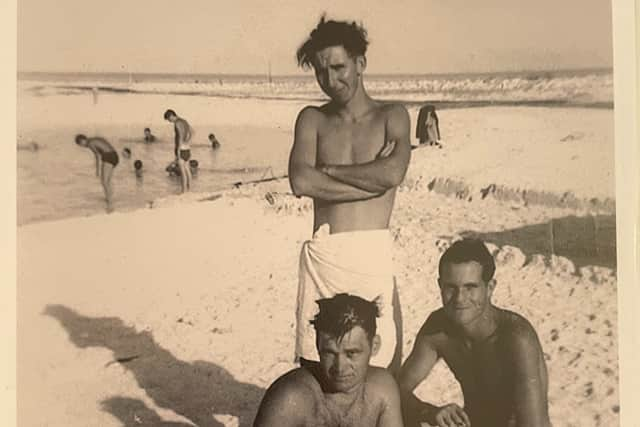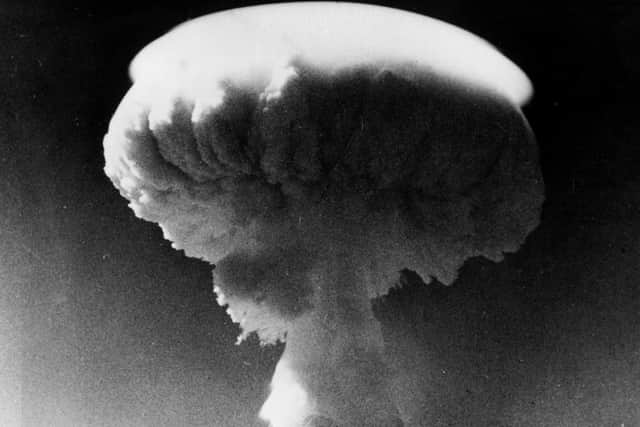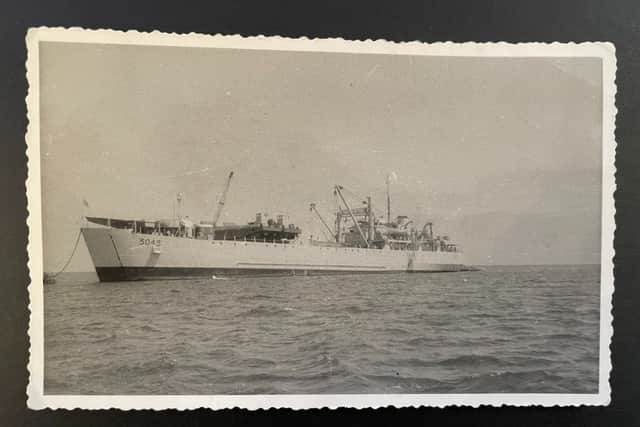British Nuclear Tests: ‘It was like looking into hell’ - how has the UK government supported its veterans?
and live on Freeview channel 276
Between the years 1952-1967, the British government conducted a series of nuclear tests, which have been described as “looking into hell”. Bryan Player, now 87, was sent to Christmas Island in the Pacific in 1957, during his Royal Navy years, to witness a hydrogen bomb test, known as GRAPPLE X.
First, he saw his bones through his fingers. Next, he felt the heat sear up his spine. Then he heard a thunderous roar before looking up to see what he described as “a swirl of disgusting colours - it was like looking into hell”.
Advertisement
Hide AdAdvertisement
Hide AdIn the intervening years, Bryan has suffered a number of ailments and illnesses, including spinal surgery, having his knees replaced and issues with his eyes. Two doctors have put this down to radiation, but they said this was impossible to prove.
News around the British Nuclear Test (BNT) veterans is muted. It hums in the background as charities such as the British Nuclear Test Veterans Association (BNTVA), and test witnesses like Bryan, fight tirelessly for recognition, and in some cases, compensation. So what were the tests? And as we approach Remembrance Day, what has the UK government done to honour their BNT veterans?


What were the British Nuclear Tests?
In 1952, the UK became the third country to develop and test nuclear weapons, as part of a nuclear weapons programme, codenamed Tube Alloys, which had been initiated during the Second World War. Around 20,000 servicemen, 21,357 British men to be exact, were present between 1952 - 1967 in Australia and the South Pacific to witness these tests.
The UK conducted 21 major tests, which occurred at the Montebello Islands, Emu Field and Maralinga. A set of four nuclear weapon tests were carried out by the UK in 1957-58 at Malden Island and Christmas Island.
What happened at the tests?


Advertisement
Hide AdAdvertisement
Hide AdBryan Player was a witness to these tests, despite being only in his early 20s at the time. He had just gotten married and just passed his petty officers course before getting a call to report to Christmas Island.
“I got called to a particular office in the barracks,” he recalls. “I was told I’d been posted out to a ship called HMS Messina, which was an ocean-going tank landing craft. I asked where - they replied, a place called Christmas Island. I asked why they said ‘Can’t tell you.’ I say, ‘what! I’m getting married’. They say ‘oh we’re not going until 28 September.’
Bryan got married on 7 September, and two weeks later flew out to Christmas Island to the HMS Messina - where he was told that was the current base for the British government’s atom bomb tests.
He said: “Our job was to take equipment and people to three or four other islands two or 300 miles away for maintenance and servicing. We’re told not to go wander around the island and enter the villages.”
Advertisement
Hide AdAdvertisement
Hide AdOn the day of the test, 8 November 1957, all officers were called up to the bridge. The ship’s company was dressed in working blues. Bryan recalls: “We were told to wear socks and shoes. Our shirts were down to our wrists, our shirts were buttoned up at our throat, buttoned up the cuffs, and we tucked our trousers into our socks.
“We were told to face away from the deck - hands over eyes. We heard the aircraft in the air, we heard the countdown and then there was this enormous, very, very bright light flash. The explosion was behind us. When the actual flash came, I saw every bone in my hands, like a massive X-ray. Then the heat came. And it felt like I’ve got a red hot iron ore, massive, great fire right behind the back. Then we were told we could turn around - there was this massive cloud going up all various colours, horrible colours, with fire going up. There was a huge ring, followed by a massive crack.
“There was a swirl of fire of purples and oranges and reds. It was like looking into hell though everything was stirring up in the air, it was getting higher and higher. It was spreading out. And then the familiar mushroom cloud went up and up and up and up. But it was in all these awful colours with this rumbling still going on.
“How can you describe the indescribable because it was like letting hell loose in a modern age.”
Advertisement
Hide AdAdvertisement
Hide AdAsked what he would like from the government in terms of compensation, Bryan replies: "Just recognition that we were there." Bryan says that promises of financial aid from "various politicians" have been suggested, and other promises of a medal are still ongoing.


What has the UK government done to support its BNT veterans?
In short, not a lot. What followed the tests was an attempted return to normal life, as Bryan recalls: “We just all went back to work on the ship and continued with our duties of service on various islands”. But as the years progressed, he became riddled with ailments.
“I’ve had spinal surgery, I’ve had surgery on my eyes, I’ve got two plastic knees. In the last five years, I’ve had two doctors saying they put my current problems down to exposure to radiation. But they said ‘you’ll never prove it’.”
In 2012, hundreds of ex-servicemen who say they were made ill as a result of being exposed to radiation during the BNTs lost their two-year Supreme Court bid to launch damages claims against the Ministry of Defence.
Advertisement
Hide AdAdvertisement
Hide AdCeri McDade is the CEO of the BNTVA. She said its “strapline is supporting our nuclear test veterans and their families for the long term - welfare oriented because the men are an average age of 86.”
It has a specific focus on moral injury, which it defines as “an act of betrayal, an act of omission and an act of commission”.
Ceri says the effect the BNT has had on veterans has “affected their lives”. “It’s been a breach of their moral code,” she says. “It changes your whole outlook on life. It affects the way you perceive the future. You can ruminate over it. You can have anger. You can have shame and guilt. You have shame if you have kids, if anybody’s got an illness, you’re thinking, is that because I took part in those tests?”
Other than the welfare and education they provide, what do the BNTVA want for BNT veterans? Ceri says: “Health and welfare. They’re old. We have a lot of veterans fighting the government still, and they want a medal. We’ve got other veterans who are disgusted by a medal because if a medal was to be awarded, it would have been - why should they beg?
Advertisement
Hide AdAdvertisement
Hide Ad“In 2015, David Cameron spoke up and thanked the (BNT) veterans for their service. So we got that far with the government several times now and something is coming up at the National Memorial Arboretum on 21 November, where the government will recognise the veterans but they won’t apologise for the tests.”
There have been a few charities aimed at helping BNT veterans, with funding coming in from the government, and the BNTVA gaining moral injury funding. However, veterans who want to claim compensation for conditions relating to exposure to radiation can apply for compensation under the War Pension Scheme.
After attending a German hearing, Ceri said the claims are “the most awful experience ever”. She explains: “It is a court, not an environment that’s friendly in any shape or form.
“What I would like to see is that they’ve just paid them all a pension, so they’ve got income coming in. They should be catered for by the government properly.
Advertisement
Hide AdAdvertisement
Hide Ad“How many times have I spoken to veterans asking if there has been any point in your life where you’ve had a bit of a tough time? They’ll go, oh, yeah, in 1984 I had a breakdown - I’m sure it’s to do with the nuclear tests.”
The Ministry of Defence was contacted for a comment.
Comment Guidelines
National World encourages reader discussion on our stories. User feedback, insights and back-and-forth exchanges add a rich layer of context to reporting. Please review our Community Guidelines before commenting.
